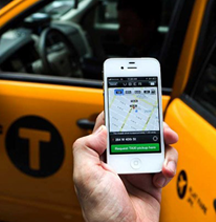Myanmar is one of the fastest growing mobile phone markets with more than 30 million users in the country so far. The government projects that by 2020, there will be 90 percent telecom penetration for the more than 50 million population, 85 percent of which will have internet access. This is good not only for connectivity, but also for the development of internet-based businesses.
Dynamics of the sharing economy
The internet provides platforms for developing business, marketing products, and services. It eliminated third-party intermediation and assumed the function of a worldwide marketplace, enabling the buyers and sellers to deal directly with each other.
Through the internet, you can buy, sell or rent anything, as long as the object is not illicit. Foremost among the mainstream players are eBay and Amazon, where you can buy and sell anything. There were even cases in the past where somebody offered his soul for sale.
In the past, a producer needs a distribution network to be able to sell products, but internet made it possible to sell globally. And it’s not only tangible products but services too. One example is Kiva, one of the pioneers in providing lending services by linking entrepreneurs in the least developed countries to individual lenders. At present, crowdfunding is one of the most preferred funding mechanisms of start-ups in developed countries.
Renting or subletting is another business method benefitting from the internet. An entrepreneur can earn by renting out properties or things that are idleor currently not in use. The property can be enrolled in a sharing platform and it will be showcased in the website and opened for all to check. Interested persons can just download an application and access rental services anywhere in the world.
Among the pioneers in the sharing economy are Uber taxi service and AirBnB. Uber is a worldwide network of car owners offering taxi services to the customers. Clients who prefer worry-free taxi services can just call an Uber and travel without hassle. Uber became very successful to the point where in some countries, regular taxi campaign against it. Some Uber operators were even attacked and harangued by regular taxi drivers.
AirBnB is another sharing economy platform that disrupted the tourism industry. It is basically renting a room for transients who prefer a cheaper, more homey ambience accommodation in their trips. People with extra homes or spaces in their homes rent them out earning from properties they are not using. But how can the owners be assured that their properties will not be vandalized or protected from pilferage? The principle of caveat emptor – let the buyers beware – prevails. Both the renter and the user of the service can check to whom they are dealing with. This is where sharing works again, this time, information. The user can leave comments on the account site about their experience in the use of property, giving other potential users insights on what to expect from the property and its owner. Conversely, the renter can also give comments on how the user used the property, giving caution to others if the user is irresponsible. Renters and properties with good comments and reviews can expect more business and irresponsible users will never get to book in the future.
These arrangements make Facebook, Twitter, Snapchat and other social media platform as a venue where information, feedback are expressed where businesses can check what the clients want. It can also be a marketing platform where new product offerings can be introduced and advertised.
What is good with sharing economy is that it spawns other businesses. Room rental will require housekeeping services especially for property owners with several units to maintain, and even contractors that supply the needs of property owners. Taxi services will also need cash washing and repair shops for maintenance.
Sharing economy in Myanmar
The sharing economy is fast developing in industries like transport, accommodation and equipment rental and Myanmar is fast catching up with the rest of the world in this area. In the transport industry, there are now Hello Cabs and Oway Ride, the local versions of Uber.
Despite the seeming glut of taxis in Yangon, there is still a need for clean, non-smelling and efficient taxi service.
Search the AirBnB Myanmar in the internet and the screen would show dots of red indicating AirBnB units in Yangon. Some are small hotels listing their rooms with AirBnB, but there are also homes and apartment units offered. This is unusual because homeowners are not allowed by law to accept non-members of the family to stay overnight, much more a foreigner. It has to be reported to the local ward leaders. But times are changing, the future cannot be hindered.
The competitive telecom industry is making it possible for innovative entrepreneurs to develop the sharing economy, stimulating the productive use of idle properties like cars, rooms, apartments, office space, equipment, etc. Placing these commodities in the market will not only produce income but also allow the customers to select the property or services that fit their needs and budget.
However, there are still issues that have to be addressed to make this a workable arrangement in Myanmar. For one, archaic laws have to be updated. Provisions that limit mobility and travel should be repealed and replaced with laws allowing rentals andhomestays but also addressing concerns of local Myanmar people who are security-conscious and who are not used to see different people coming in and going out of a neighbor’s house.
The upgrading of the payment system has to be fast tracked. Credit cards are now gradually being used in key cities, and it has to be expanded to other areas as this is one of the main methods of payment in a sharing economy. Foreign tourists are more inclined to use plastic instead of cash.
Related to this is the problem of power outage. Even in Yangon blackout is still experienced. This affects the functionality of the internet and payment system connections. Bigger companies may have reserved power generators, but small entrepreneurs may not be able to afford such equipment.
Investing in the sharing economy
Promoting sharing economy will contribute to the efforts of pushing the country’s economy up. This can be considered as a ‘low hanging fruit’ that can be picked easily. Using private capital, it will develop enterprises, create employment, generate income and provide taxes
The tourism industry is most like where the enterprises will come, and it may have ripple effects on other industries as well. Yangon and Mandalay may be the starting point of these enterprises and it can spread to other tourist areas that are generating more traffic. The government should start working on creating the right environment for the sharing economy to thrive in Myanmar by updating laws and identifying key areas in the country where the platform can best be utilized.










